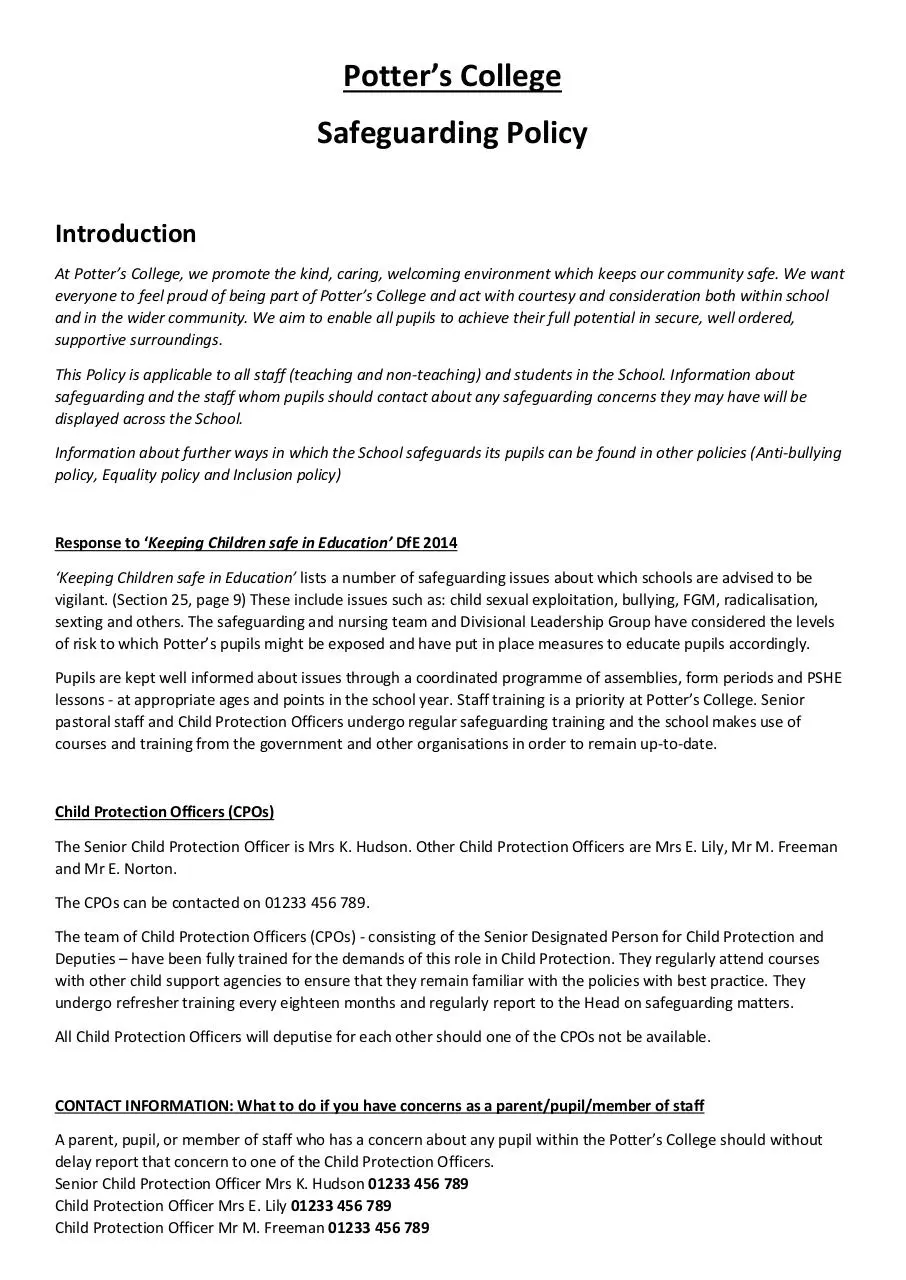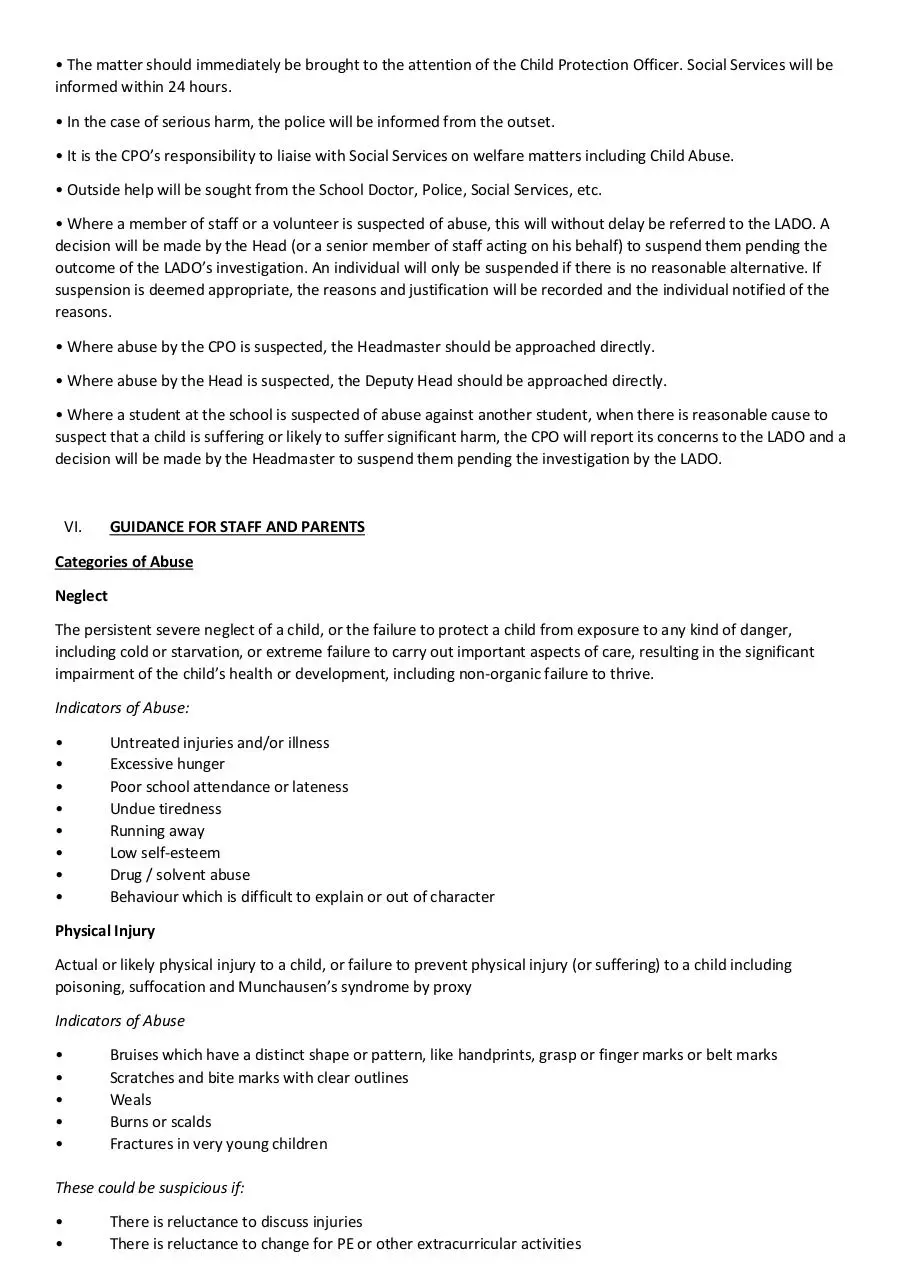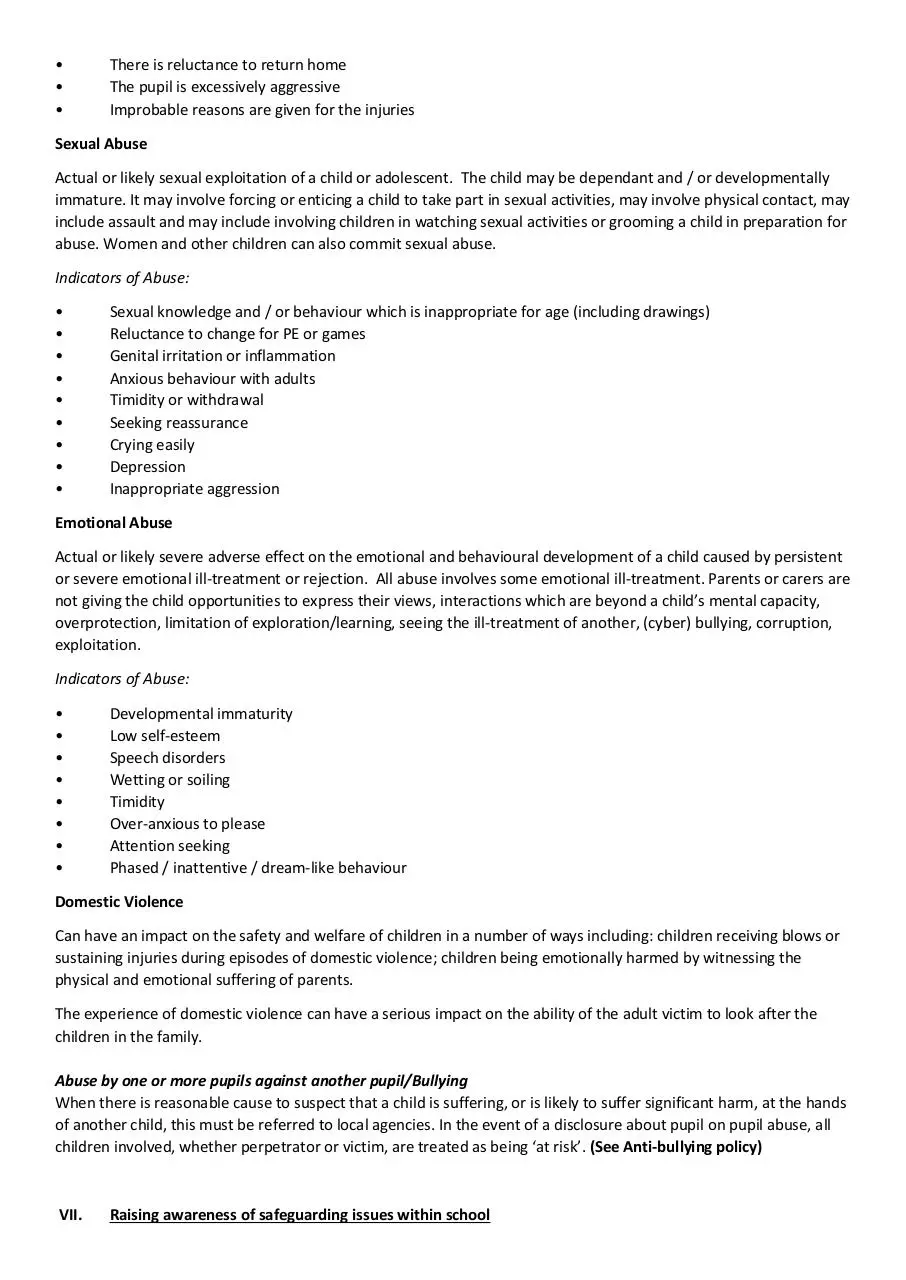St Potter college safeguarding policy (PDF)
File information
Author: MARION DUPONT
This PDF 1.5 document has been generated by Microsoft® Word 2010, and has been sent on pdf-archive.com on 24/02/2015 at 15:57, from IP address 194.81.x.x.
The current document download page has been viewed 784 times.
File size: 422.98 KB (7 pages).
Privacy: public file





File preview
Potter’s College
Safeguarding Policy
Introduction
At Potter’s College, we promote the kind, caring, welcoming environment which keeps our community safe. We want
everyone to feel proud of being part of Potter’s College and act with courtesy and consideration both within school
and in the wider community. We aim to enable all pupils to achieve their full potential in secure, well ordered,
supportive surroundings.
This Policy is applicable to all staff (teaching and non-teaching) and students in the School. Information about
safeguarding and the staff whom pupils should contact about any safeguarding concerns they may have will be
displayed across the School.
Information about further ways in which the School safeguards its pupils can be found in other policies (Anti-bullying
policy, Equality policy and Inclusion policy)
Response to ‘Keeping Children safe in Education’ DfE 2014
‘Keeping Children safe in Education’ lists a number of safeguarding issues about which schools are advised to be
vigilant. (Section 25, page 9) These include issues such as: child sexual exploitation, bullying, FGM, radicalisation,
sexting and others. The safeguarding and nursing team and Divisional Leadership Group have considered the levels
of risk to which Potter’s pupils might be exposed and have put in place measures to educate pupils accordingly.
Pupils are kept well informed about issues through a coordinated programme of assemblies, form periods and PSHE
lessons - at appropriate ages and points in the school year. Staff training is a priority at Potter’s College. Senior
pastoral staff and Child Protection Officers undergo regular safeguarding training and the school makes use of
courses and training from the government and other organisations in order to remain up-to-date.
Child Protection Officers (CPOs)
The Senior Child Protection Officer is Mrs K. Hudson. Other Child Protection Officers are Mrs E. Lily, Mr M. Freeman
and Mr E. Norton.
The CPOs can be contacted on 01233 456 789.
The team of Child Protection Officers (CPOs) - consisting of the Senior Designated Person for Child Protection and
Deputies – have been fully trained for the demands of this role in Child Protection. They regularly attend courses
with other child support agencies to ensure that they remain familiar with the policies with best practice. They
undergo refresher training every eighteen months and regularly report to the Head on safeguarding matters.
All Child Protection Officers will deputise for each other should one of the CPOs not be available.
CONTACT INFORMATION: What to do if you have concerns as a parent/pupil/member of staff
A parent, pupil, or member of staff who has a concern about any pupil within the Potter’s College should without
delay report that concern to one of the Child Protection Officers.
Senior Child Protection Officer Mrs K. Hudson 01233 456 789
Child Protection Officer Mrs E. Lily 01233 456 789
Child Protection Officer Mr M. Freeman 01233 456 789
Child Protection Officer Mr E. Norton 01233 456 789
Headmaster 01233 456 789
CEC Safeguarding Children in Education and Settings 0300 123 5033
Police Protection Unit 0845 458 0000
Ofsted 0300 123 4666
Summary (CLICK ON THE LINK TO ACCESS FULL POLICY)
I – Staff duties
II – Staff training
III – Reporting to CPOs
IV – Advice for staff on pupil disclosure
V – Making referrals to external agencies
VI – Guidance for parents and staff
VII – Raising awareness within the school
VIII – Appointment of staff
IX – Guidance towards professional standards
X – Storage of files
I.
Staff duties
Potter’s College staff members are obliged to:
• Stand by the Safeguarding Policy and follow the advice and procedures without failing
• Attend training as required by the school
• Report immediately to the Child Protection Officer (CPO) any suspected cases of abuse and not to share that
information with any other person unless guided to do so by the CPO
• Play a proactive role in contributing to the safeguarding of Potter’s pupils
• Keep accurate, objective and up-to-date notes about any case with which they may be involved. The Data
Protection Act states that information should be: ‘accurate, up-to-date, fit for purpose, relevant’
• make the CPO aware of any queries they may have regarding the School’s safeguarding procedures
• attend refresher training as provided by Potter’s CPOs
II.
Staff training
• Staff is provided with up-to-date and high quality safeguarding training every 18 months
• New Staff appointed have a meeting with the Senior Child Protection Officer (CPO) and receive appropriate
training
• Staff is given a copy of the Safeguarding Policy, Potter’s Safeguarding Guidance and Procedures, the Staff Code of
Conduct, a copy of Part 1 of ‘Keeping Children Safe in Education’ and the names of all the Child Protection Officers,
for which they sign to acknowledge receipt.
• The Potter’s College takes the safeguarding of its pupils extremely seriously. Temporary and voluntary staff are
made aware of the School’s Safeguarding Policy, on arrival at the school and training is provided at regular intervals
for newcomers
• The School will also offer training on issues such as eating disorders, other mental health problems, and First Aid as
part of its Staff Development Programme. Specific safeguarding training and advice is given to those colleagues who
engaged in one-to-one teaching, such as specialist DT provision.
• It is the CPOs’ responsibility to ensure that pupils and staff are well-informed about the specific safeguarding issues
through PSHE, the form period programme, assemblies and staff training sessions.
III.
Reporting safeguarding and child protection concerns to the Child Protection Officer
When reporting suspected abuse, staff must:
Listen to the children and never promise confidentiality
Let the CPO (or deputy) know of their concerns immediately
Not share this information with others or investigate
Keep accurate, factual and objective notes
Delete these notes once the CPO has acknowledged receipt.
It is important that children receive help at the right time to address risks and prevent issues escalating and that
colleagues act upon and refer any early sign of abuse or neglect without delay. Keeping clear records, listening to the
views of the child and reassessing concerns when situations do not improve, sharing information and challenging
inaction are essential elements of Potter’s College approach to safeguarding.
‘Keeping children safe in education’ DfE (2014) reminds us that any colleague may make a referral to external
agencies if the need arises.
IV.
What to do in the event of a pupil disclosure – advice for staff
• If you are in a public place, make arrangements to talk in a room where you can talk in private
• Do not promise confidentiality to the child. You might say ‘I need to let you know that if you tell me anything which
makes me believe you might be at risk, I shall have to tell the Child Protection Officer’
• Do not ask any leading questions, i.e. any question which might trigger a yes/no response.
• Reassure the young person that they have done the right thing in telling you.
• As soon as you are able, make an accurate, detailed and objective account of what has been said. If appropriate,
you might also ask the young person do to this. Sign and date any statements.
• Call the CPO immediately to let them know of the disclosure. If you are not sure whether or not the child is safe to
go home, do not let her leave until you have spoken to a CPO.
• If the child is able to go, tell her what will happen next and reassure her that she has done the right thing.
• Send your original report on the disclosure (and that of the child) to the CPO, who will keep the original copy on
the child’s safeguarding file.
• If you send an electronic version of a report via email, mark the mail ‘Strictly private and confidential’ and send it
only to the CPO; do not copy in others. Once receipt of this has been acknowledged, delete your copy of the report.
V.
Making referrals to external agencies
The School has regard to the DfE guidance, Dealing with Allegations of Abuse and Other Staff. Where abuse is
suspected by either an adult or a student:
• The matter should immediately be brought to the attention of the Child Protection Officer. Social Services will be
informed within 24 hours.
• In the case of serious harm, the police will be informed from the outset.
• It is the CPO’s responsibility to liaise with Social Services on welfare matters including Child Abuse.
• Outside help will be sought from the School Doctor, Police, Social Services, etc.
• Where a member of staff or a volunteer is suspected of abuse, this will without delay be referred to the LADO. A
decision will be made by the Head (or a senior member of staff acting on his behalf) to suspend them pending the
outcome of the LADO’s investigation. An individual will only be suspended if there is no reasonable alternative. If
suspension is deemed appropriate, the reasons and justification will be recorded and the individual notified of the
reasons.
• Where abuse by the CPO is suspected, the Headmaster should be approached directly.
• Where abuse by the Head is suspected, the Deputy Head should be approached directly.
• Where a student at the school is suspected of abuse against another student, when there is reasonable cause to
suspect that a child is suffering or likely to suffer significant harm, the CPO will report its concerns to the LADO and a
decision will be made by the Headmaster to suspend them pending the investigation by the LADO.
VI.
GUIDANCE FOR STAFF AND PARENTS
Categories of Abuse
Neglect
The persistent severe neglect of a child, or the failure to protect a child from exposure to any kind of danger,
including cold or starvation, or extreme failure to carry out important aspects of care, resulting in the significant
impairment of the child’s health or development, including non-organic failure to thrive.
Indicators of Abuse:
•
•
•
•
•
•
•
•
Untreated injuries and/or illness
Excessive hunger
Poor school attendance or lateness
Undue tiredness
Running away
Low self-esteem
Drug / solvent abuse
Behaviour which is difficult to explain or out of character
Physical Injury
Actual or likely physical injury to a child, or failure to prevent physical injury (or suffering) to a child including
poisoning, suffocation and Munchausen’s syndrome by proxy
Indicators of Abuse
•
•
•
•
•
Bruises which have a distinct shape or pattern, like handprints, grasp or finger marks or belt marks
Scratches and bite marks with clear outlines
Weals
Burns or scalds
Fractures in very young children
These could be suspicious if:
•
•
There is reluctance to discuss injuries
There is reluctance to change for PE or other extracurricular activities
•
•
•
There is reluctance to return home
The pupil is excessively aggressive
Improbable reasons are given for the injuries
Sexual Abuse
Actual or likely sexual exploitation of a child or adolescent. The child may be dependant and / or developmentally
immature. It may involve forcing or enticing a child to take part in sexual activities, may involve physical contact, may
include assault and may include involving children in watching sexual activities or grooming a child in preparation for
abuse. Women and other children can also commit sexual abuse.
Indicators of Abuse:
•
•
•
•
•
•
•
•
•
Sexual knowledge and / or behaviour which is inappropriate for age (including drawings)
Reluctance to change for PE or games
Genital irritation or inflammation
Anxious behaviour with adults
Timidity or withdrawal
Seeking reassurance
Crying easily
Depression
Inappropriate aggression
Emotional Abuse
Actual or likely severe adverse effect on the emotional and behavioural development of a child caused by persistent
or severe emotional ill-treatment or rejection. All abuse involves some emotional ill-treatment. Parents or carers are
not giving the child opportunities to express their views, interactions which are beyond a child’s mental capacity,
overprotection, limitation of exploration/learning, seeing the ill-treatment of another, (cyber) bullying, corruption,
exploitation.
Indicators of Abuse:
•
•
•
•
•
•
•
•
Developmental immaturity
Low self-esteem
Speech disorders
Wetting or soiling
Timidity
Over-anxious to please
Attention seeking
Phased / inattentive / dream-like behaviour
Domestic Violence
Can have an impact on the safety and welfare of children in a number of ways including: children receiving blows or
sustaining injuries during episodes of domestic violence; children being emotionally harmed by witnessing the
physical and emotional suffering of parents.
The experience of domestic violence can have a serious impact on the ability of the adult victim to look after the
children in the family.
Abuse by one or more pupils against another pupil/Bullying
When there is reasonable cause to suspect that a child is suffering, or is likely to suffer significant harm, at the hands
of another child, this must be referred to local agencies. In the event of a disclosure about pupil on pupil abuse, all
children involved, whether perpetrator or victim, are treated as being ‘at risk’. (See Anti-bullying policy)
VII.
Raising awareness of safeguarding issues within school
- Form periods
- PSHE lessons
- Posters in classrooms display the identities of the CPOs and nurses
- Teachers are issued with cards which give key safeguarding guidance
- Assemblies are given about the role of the CPOs
- Pupil planners give pupils advice about where to turn to if they have a concern, both inside and outside of school
- Pupils are invited to raise any concerns they have about their safety at College Council
- The School works closely with CEOP and seeks to pass on up-to-date advice about keeping safe on-line through
assemblies and form periods (see E-safety paragraph in Anti-bullying policy)
- When a story relating to e-safety appears in the news, this will often be followed up in school
- The School invites a local police officer, into School once a year to talk to parents and pupils about e-safety.
Ensuring that pupils know to whom they can turn if they have a concern about themselves or another young person,
whether within or outside of school, is an important part of our safeguarding procedures. The CPOs give assemblies
explaining their roles; pupil planners contain information giving children advice about to whom they should turn in
school, as well as key phone numbers to call outside of school; and posters in classrooms remind pupils of the
identity of the CPOs and the nurses.
VIII.
Appointment of Staff
It is imperative that all interviews to appoint staff reflect the importance of safeguarding children.
All teaching and non-teaching appointments at the College are subject to:
a)
Satisfactory confidential references
b)
An enhanced CRB check
c)
A full history of education / employment
When appointments are being made it is essential that the following ‘Aware Culture’ checklist is used:
•
Information will be provided to applicants that clearly states this organisation will create a safe environment
for young people – enclose summary of Child Protection
•
Candidates will be asked to confirm identity through official documents
•
The authenticity of qualifications and references will be verified directly
•
A full employment history of prospective staff members will be sought together with the right to approach
any previous employer, checking with former employers the reason why employment ended; identifying any
inconsistencies and seeking an explanation
•
Interviews will be prepared to explore with candidates their attitudes towards young people, their
perceptions about the boundaries of acceptable behaviour towards children / young people, and ask
questions about sexual boundaries and attitudes.
Confidentiality
Pupils are aware that they may speak with the CPOs in confidence and that information will be shared with others
only if the pupil is felt to be at risk. Should any allegations of abuse by or against any member of the School
community be made, these will be dealt with in the strictest confidence.
Allegations against members of staff
Any allegation against a member of the Potter’s College staff should be reported immediately to the Head, who will
make the LADO aware of the allegation without delay.
IX.
Guidance regarding professional standards
Members of staff must always act in a professional manner and keep a professional distance from pupils.
They MUST:
Not have contact with pupils via Facebook
Not use pupils’ private mobile numbers or give out their own personal mobile number to pupils
Not post photos of pupils from school trips on their own Facebook page
Not take photos of pupils on their own camera or phone
Act in such a way so as to seen not to have favourites
Not meet pupils privately outside of school
Must talk to the CPO or a member of SMT if they are unsure about professional standards and seek guidance
If a member of staff is unsure about these guidelines or is concerned about his/her own behaviour, or that of a pupil
or colleague, he/she must speak to the CPO.
X.
Storage of files
The Child Protection Officer is responsible for keeping safeguarding and Child protection files up-to-date. No other
copies of files should exist. Colleagues must pass signed original copies of reports on to the CPO who will keep these
in the child’s safeguarding file. If a member of staff has sent a report relating to a Child Protection issue to the CPO
via email, he/she must delete the electronic version of that report, upon acknowledgement of receipt by the CPO.
Author: Headmaster and safeguarding and nursing team
Approved: Governing Body, January 2015
Review Date: September 2015
Download St Potter college safeguarding policy
St Potter college safeguarding policy.pdf (PDF, 422.98 KB)
Download PDF
Share this file on social networks
Link to this page
Permanent link
Use the permanent link to the download page to share your document on Facebook, Twitter, LinkedIn, or directly with a contact by e-Mail, Messenger, Whatsapp, Line..
Short link
Use the short link to share your document on Twitter or by text message (SMS)
HTML Code
Copy the following HTML code to share your document on a Website or Blog
QR Code to this page

This file has been shared publicly by a user of PDF Archive.
Document ID: 0000211166.